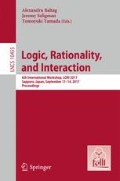Abstract
This paper positively solves an open problem if it is possible to provide a Hilbert system to Epistemic Logic of Friendship (EFL) by Seligman, Girard and Liu. To find a Hilbert system, we first introduce a sound, complete and cut-free tree (or nested) sequent calculus for EFL, which is an integrated combination of Seligman’s sequent calculus for basic hybrid logic and a tree sequent calculus for modal logic. Then we translate a tree sequent into an ordinary formula to specify a Hilbert system of EFL and finally show that our Hilbert system is sound and complete for an intended two-dimensional semantics.
Access this chapter
Tax calculation will be finalised at checkout
Purchases are for personal use only
Notes
- 1.
By (K)-rules and (Nec)-rules for \(\Box \), \(\mathsf {F}\) and \(@_{n}\), the replacement of equivalence holds in \(\mathsf {H}\mathbf {EFL}\).
- 2.
Given a set \(\varGamma \cup \{{\varphi }\}\) of formulas, we say that \(\varphi \) is deducible in \(\mathsf {H}\mathbf {EFL}\) from \(\varGamma \) if there exist finite formulas \(\psi _{1}\), \(\ldots \), \(\psi _{n} \in \varGamma \) such that \((\psi _{1}\wedge \ldots \wedge \psi _{n}) \rightarrow \varphi \) is provable in \(\mathsf {H}\mathbf {EFL}\). Then it is easy to see that the deduction theorem holds in \(\mathsf {H}\mathbf {EFL}\).
- 3.
We do not need to assume that each of our models is named in the sense that each agent is named by an agent nominal.
References
Areces, C., ten Cate, B.: Hybrid logics. In: Blackburn, P., van Benthem, J., Wolter, F. (eds.) Handbook of Modal Logic, pp. 821–868. Elsevier, Amsterdam (2007)
Baltag, A., Moss, L., Solecki, S.: The logic of public announcements, common knowledge and private suspicions. In: Proceedings of TARK, pp. 43–56. Morgan Kaufmann Publishers, Los Altos (1989)
Blackburn, P.: Arthur prior and hybrid logic. Synthese 150(3), 329–372 (2006)
Blackburn, P., de Rijke, M., Venema, Y.: Modal Logic. Cambridge Tracts in Theoretical Computer Science. Cambridge University Press, Cambridge (2001)
Blackburn, P., ten Cate, B.: Pure extensions, proof rules, and hybrid axiomatics. Studia Logica 84(3), 277–322 (2006)
Blackburn, P., Tzakova, M.: Hybrid completeness. Logic J. IGPL 6(4), 625–650 (1998)
Braüner, T.: Hybrid Logic and Its Proof-Theory. Applied Logic Series, vol. 37. Springer, Dordrecht (2011). doi:10.1007/978-94-007-0002-4
Brünnler, K.: Deep sequent systems for modal logic. Arch. Math. Logic 48, 551–577 (2009)
Christoff, Z., Hansen, J.U., Proetti, C.: Reflecting on social influence in networks. J. Logic Lang. Inf. 25(3), 299–333 (2016)
Fitting, M., Thalmann, L., Voronkov, A.: Term-modal logics. Studia Logica 69(1), 133–169 (2001)
Gargov, G., Passy, S., Tinchev, T.: Modal environment for Boolean speculations (preliminary report). In: Skordev, D. (ed.) Mathematical Logic and its Applications. Proceedings of the Summer School and Conference dedicated to the 80th Anniversary of Kurt Gödel, pp. 253–263. Plenum Press, Druzhba (1987)
Girard, P., Seligman, J., Liu, F.: General dynamic dynamic logic. In: Ghilardi, S., Bolander, T., Braüner, T., Moss, L.S. (eds.) Advances in Modal Logics, vol. 9, pp. 239–260. College Publications, London (2012)
Goldblatt, R.: Axiomatising the Logic of Computer Programming. LNCS, vol. 130. Springer, Heidelberg (1982)
Hintikka, J.: Knowledge and Belief: An Introduction to the Logic of the Two Notions. Cornell University Press, Cornell (1962)
Kashima, R.: Cut-free sequent calculi for some tense logics. Studia Logica 53, 119–135 (1994)
Negri, S.: Proof analysis in modal logic. J. Philos. Logic 34, 507–544 (2005)
Negri, S., Von Plato, J.: Structural Proof Theory. Cambridge University Press, Cambridge (2001)
Negri, S., Von Plato, J.: Proof Analysis. Cambridge University Press, Cambridge (2011)
Plaza, J.A.: Logics of public communications. In: Emrich, M.L., Pfeifer, M.S., Hadzikadic, M., Ras, Z.W. (eds.) Proceedings of the 4th International Symposium on Methodologies for Intelligent Systems, pp. 201–216 (1989)
Sano, K.: Axiomatizing hybrid products: How can we reason many-dimensionally in hybrid logic? J. Appl. Logic 8(4), 459–474 (2010)
Seligman, J.: Internalization: the case of hybrid logics. J. Logic Comput. 11(5), 671–689 (2001)
Seligman, J., Liu, F., Girard, P.: Logic in the community. In: Banerjee, M., Seth, A. (eds.) ICLA 2011. LNCS, vol. 6521, pp. 178–188. Springer, Heidelberg (2011). doi:10.1007/978-3-642-18026-2_15
Seligman, J., Liu, F., Girard, P.: Facebook and the epistemic logic of friendship. In: Proceedings of the 14th Conference on Theoretical Aspects of Rationality and Knowledge (TARK 2013), Chennai, India, pp. 230–238, 7–9 January 2013
Seligman, J., Liu, F., Girard, P.: Knowledge, friendship and social announcement. In: van Benthem, J., Liu, F. (eds.) Logic Across the University: Foundations and Applications. Studies in Logic, vol. 47, pp. 445–469. College Publications, London (2013)
Acknowledgments
I would like to thank the anonymous reviewers for their careful reading of the manuscript and their many useful comments and suggestions. I presented the contents of this paper first at the 48th MLG meeting at Kaga, Ishikawa, Japan on 6th December 2013 and then at Kanazawa Workshop for Epistemic Logic and its Dynamic Extensions, Kanazawa, Japan on 22nd February 2014. I would like to thank Jeremy Seligman and Fenrong Liu for fruitful discussions of the topic. All errors, however, are mine. The work of the author was partially supported by JSPS KAKENHI Grant-in-Aid for Young Scientists (B) Grant Number 15K21025 and JSPS Core-to-Core Program (A. Advanced Research Networks).
Author information
Authors and Affiliations
Corresponding author
Editor information
Editors and Affiliations
Rights and permissions
Copyright information
© 2017 Springer-Verlag GmbH Germany
About this paper
Cite this paper
Sano, K. (2017). Axiomatizing Epistemic Logic of Friendship via Tree Sequent Calculus. In: Baltag, A., Seligman, J., Yamada, T. (eds) Logic, Rationality, and Interaction. LORI 2017. Lecture Notes in Computer Science(), vol 10455. Springer, Berlin, Heidelberg. https://doi.org/10.1007/978-3-662-55665-8_16
Download citation
DOI: https://doi.org/10.1007/978-3-662-55665-8_16
Published:
Publisher Name: Springer, Berlin, Heidelberg
Print ISBN: 978-3-662-55664-1
Online ISBN: 978-3-662-55665-8
eBook Packages: Computer ScienceComputer Science (R0)


